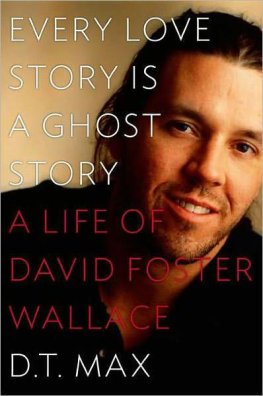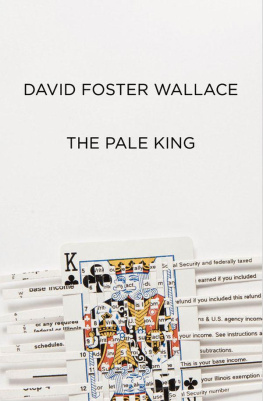EVERY LOVE STORY
IS A GHOST STORY

ALSO BY D. T. MAX
The Family That Couldnt Sleep: A Medical Mystery
EVERY LOVE STORY
IS A GHOST STORY
A LIFE OF DAVID FOSTER WALLACE
D. T. Max
VIKING
VIKING
Published by the Penguin Group
Penguin Group (USA) Inc., 375 Hudson Street,
New York, New York 10014, U.S.A.
Penguin Group (Canada), 90 Eglinton Avenue East, Suite 700,
Toronto, Ontario, Canada M4P 2Y3
(a division of Pearson Penguin Canada Inc.)
Penguin Books Ltd, 80 Strand, London WC2R 0RL, England
Penguin Ireland, 25 St. Stephens Green, Dublin 2, Ireland
(a division of Penguin Books Ltd)
Penguin Books Australia Ltd, 250 Camberwell Road, Camberwell,
Victoria 3124, Australia
(a division of Pearson Australia Group Pty Ltd)
Penguin Books India Pvt Ltd, 11 Community Centre, Panchsheel Park,
New Delhi 110 017, India
Penguin Group (NZ), 67 Apollo Drive, Rosedale, Auckland 0632,
New Zealand (a division of Pearson New Zealand Ltd)
Penguin Books (South Africa) (Pty) Ltd, 24 Sturdee Avenue,
Rosebank, Johannesburg 2196, South Africa
Penguin Books Ltd, Registered Offices:
80 Strand, London WC2R 0RL, England
First published in 2012 by Viking Penguin,
a member of Penguin Group (USA) Inc.
10 9 8 7 6 5 4 3 2 1
Copyright D. T. Max, 2012
All rights reserved
A portion of this book appeared in different form as The Unfinished: David Foster Wallaces Struggle to Surpass Infinite Jest in The New Yorker.
Grateful acknowledgment is made for permission to reprint excerpts from the unpublished writings of David Foster Wallace. Copyright 2012 The David Foster Wallace Literary Trust. Used by permission of The David Foster Wallace Literary Trust.
Max, D. T. (Daniel T.)
Every love story is a ghost story : a life of David Foster Wallace / D.T. Max.
p. cm.
Includes index.
ISBN: 978-1-101-60111-2
1. Wallace, David Foster. 2. Novelists, American20th centuryBiography. I. Title.
PS3573.A425635Z83 2012
813.54dc23 [B] 2012008488
Printed in the United States of America
Set in Warnock Pro
Designed by Alissa Amell
No part of this book may be reproduced, scanned, or distributed in any printed or electronic form without permission. Please do not participate in or encourage piracy of copyrighted materials in violation of the authors rights. Purchase only authorized editions.
ALWAYS LEARNING
PEARSON
For Flora and for Jules forever
What goes on inside is just too fast and huge and all interconnected for words to do more than barely sketch the outlines of at most one tiny little part of it at any given instant.
GOOD OLD NEON , 2001
CONTENTS
CHAPTER 1
Call Me Dave
Every story has a beginning and this is David Wallaces. He was born in Ithaca, New York, on February 21, 1962. His father, James, was a graduate student in philosophy at Cornell, from a family of professionals. Davids mother, Sally Foster, came from a more rural background, with family in Maine and New Brunswick, her father a potato farmer. Her grandfather was a Baptist minister who taught her to read with the Bible. She had gotten a scholarship to a boarding school and from there gone to Mount Holyoke College to study English. She became the student body president and the first member of her family to get a bachelors degree.
Jim and Sally had their daughter, Amy, two years after David, by which time the family had moved to Champaign-Urbana, twin cities in central Illinois and the home of the states most important public university. The family had not wanted to leave CornellSally and Jim loved the rolling landscape of the regionbut Wallace had been offered a job in the philosophy department in the university and felt he could not turn it down. The couple were amazed when they arrived to see how bleak their new city was, how flat and bare. But soon, happily, Jims appointment turned into a tenure-track post, Sally went back to school to get her masters in English literature, and the family settled in, eventually, in 1969, buying a small yellow two-story house on a one-block-long street in Urbana, near the university. Just a few blocks beyond were fields of corn and soybeans, prairie farmland extending as far as the eye could see, endless horizons.
Here, Wallace and his sister grew up alongside others like themselves, in houses where learning was highly valued. But midwestern virtues of normality, kindness, and community also dominated. Showing off was discouraged, friendliness important. The Wallace house was modest in size and looked out at other modest-sized houses. You were always near your neighbors and kids in the neighborhood lived much of their lives, a friend remembers, on their bikes, in packs. Every other kid in that era, it seemed, was named David.
There was elementary school at Yankee Ridge and then homework. The Wallaces ate at 5:45 p.m. Afterward, Jim Wallace would read stories to Amy and David. And then every night the children would get fifteen minutes each in their beds to talk to Sally about anything that was on their minds. Lights-out was at 8:30 p.m., later as the years went on. After the children were asleep, the Wallace parents would talk, catch up with each other, watch the 10 p.m. evening news, and Jim would turn the lights out at 10:30 exactly. He came home every week from the library with an armful of books. Sally especially loved novels, from John Irving to college classics shed reread. In Davids eyes, the household was a perfect, smoothly running machine; he would later tell interviewers of his memory of his parents lying in bed, holding hands, reading Ulysses to each other.
For David, his mother was the center of the universe. She cooked his favorites, roast beef and macaroni and cheese, and baked his chocolate birthday cake and drove the children where they needed to go in her VW Bug. Later, after an accident, she replaced it with a Gremlin. She made beef bourguignonne on Davids birthday and sewed labels into his clothes (some of which Wallace would still wear in college).
No one else listened to David as his mother did. She was smart and funny, easy to confide in, and included him in her love of words. Even in later years, and in the midst of his struggle with the legacy of his childhood, he would always speak with affection of the passion for words and grammar she had given him. If there was no word for a thing, Sally Wallace would invent it: greebles meant little bits of lint, especially those that feet brought into bed; twanger was the word for something whose name you didnt know or couldnt remember. She loved the word fantods, meaning a feeling of deep fear or repulsion, and talked of the howling fantods, this fear intensified. These words, like much of his childhood, would wind up in Wallaces work.
To outside eyes, Sallys enthusiasm for correct usage might seem extreme. When someone made a grammatical mistake at the Wallace dinner table, she would cough into her napkin repeatedly until the speaker saw the error. She protested to supermarkets whenever she saw the sign Ten items or less posted above their express checkout lines. (Wallace would later give this campaign in Infinite Jest to the predatory mother figure of Avril Incandenza, cofounder of Militant Grammarians of Massachusetts.) For Sally, grammar was more than just a tool. It gave membership in the club of educated persons. The intimation that so much was at stake in each utterance thrilled David, and added to the excitement of having a gifted mother. As did her sensitivitySally hated to shout. If she was upset by something she would write a note. And if David or Amy had a response, they would slip it back under her door in turn. Even as a little boy, Wallace was attuned to the delicate drama of personality. He wrote when he was around five years oldand one hears in the words the sigh of the woman who prompted it:
Next page











